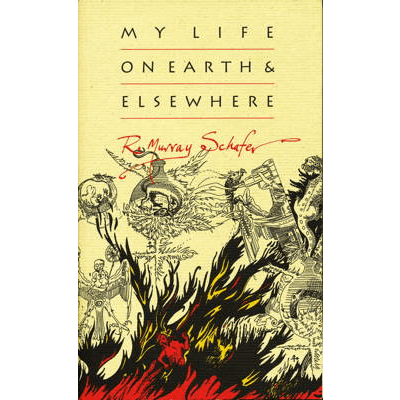 SPONSORED: So Much, for So Many. R Murray Schafer's 'My Life on Earth and Elsewhere', read by A P Virag.
SPONSORED: So Much, for So Many. R Murray Schafer's 'My Life on Earth and Elsewhere', read by A P Virag.
All sponsored features >>
- Lyell Cresswell
- eleventh century
- Rued Langgaard
- rhythm
- Digressione Music srl
- Sorabji
- Gladys Maria Nockin Chandler
- didgeridoo music
ARTICLES BEING VIEWED NOW:
- Hector Berlioz
- Tan Dun
- Igor Luchenok
- Alan Shulman
- Régine Crespin
Erik Satie
Eccentric French composer Erik Satie was born Éric Alfred Leslie Satie on 17 May 1866 at Honfleur in Normandy. He attended the Paris Conservatoire in 1879 but received very negative feedback from his teachers - his piano playing was considered insignificant, laborious and worthless, and he was branded the 'laziest student in the Conservatoire'. It was clear that his real talent lay in composition, although he also contributed to a range of publications, sometimes using pseudonyms.
He became known as a 'gymnopedist' in 1887, before he wrote the Gymnopédies, which became his most famous compositions. Other eccentric behaviour included referring to himself as a 'phonometrician' (someone who measures sounds), deliberately infecting himself with bronchitis to get discharged from military service, announcing the premiere of an anti-Wagnerian opera Le bâtard de Tristan (which Satie probably never wrote), founding his own church and writing Three pieces in the form of a pear.
His philosophy seemed to involve rejecting musical development and certain aspects of Romanticism, and not taking any more of his audience's time than was strictly necessary. As a result, many of his compositions were very short.
From 1899, when he fell on hard times, he made an income as a cabaret pianist, and in 1905, continuing his cabaret work, he enrolled for Vincent d'Indy's class to learn classical counterpoint.
Satie's piano miniatures began to be successful from 1912 onwards, and he was pleased until realising that his more recent work was being ignored.
He drank heavily in his later years, and died from cirrhosis of the liver on 1 July 1925, leaving many unpublished compositions hidden in unusual places in his apartment at Arcueil.
A selection of articles about Erik Satie
Classical music news. Obituary - Ronald Corp (1951-2025)
Ensemble. An Outstanding Player - Mike Wheeler reports on Jack Hancher's Buxton Festival guitar recital
CD Spotlight. The Magic of Ballets Russes - Giuseppe Pennisi listens to Warner Classics' box set. '... a gem which should be on the shelves of all those interested in the music of the early decades of the twentieth century ...'
Ensemble. When I'm Sixty-Four - Giuseppe Pennisi visits the Spoleto Festival
CD Spotlight. Saying Goodbye - Music in response to Debussy's early death, reviewed by Geoff Pearce. 'The performances are great all round, and this is a useful addition to anyone's collection.'
Classical music news. Hans van Manen Variations - Dutch National Ballet livestreams six ballets from the Dutch master of dance, with musical accompaniment by the Dutch Ballet Orchestra
CD Spotlight. A Quintessentially French Bestiary - French songs by various composers, heard by Gerald Fenech. 'Ducks, peacocks, pigs, butterflies, dromedaries, carp, cicadas and owls are just some of the creatures in the menagerie assembled for this recording.'
CD Spotlight. Double Meanings? - Seattle-based ensemble Torch, heard by Keith Bramich. '... the music sounds modern, jazzy, light and almost aleatoric-sounding.'
CD Spotlight. Genuine Appreciation - Piano music by Richard Fowles in homage to Erik Satie, appreciated by Paul Sarcich. 'Christina McMaster is fully sensitive to the spirit of the enterprise ...'
Andrew Schartmann's Musical Tidbits - Pop Music and the Classical Idiom. Part II: Creative Quotations
CD Spotlight. A Curate's Egg - Satie, Glass, Feldman and Schubert, heard by Howard Smith. '... amiable verve ...'
Complete Engagement - Mike Wheeler listens to pianist Helen Reid
CD Spotlight. An Outright Winner - Dave Lee and friends' horn-centred pot pourri, strongly recommended by Howard Smith. '... positively mesmerizing ...'
Timings - Breaking Moulds: 1910, by Jennifer Paull
Ensemble. Museum Culture? - Experimental music by Cage, Cowell, Feldman, Rzewski, Satie and Wolff, heard by Malcolm Miller
CD Spotlight. An Undisturbed Evenness - Choral music 'from a Russian cathedral', heard by Paul Sarcich. '... engineered to tranquillity ...'
CD Spotlight. Engagingly Heartening - Choral and orchestral music by Arthur Honegger, enjoyed by Howard Smith. '... strikingly performed by Welsh forces ...'
Ensemble. Sparkling Performances - Yvonne Kenny and Iain Burnside at London's Wigmore Hall, reviewed by Robert Hugill
'Postlude' and other nonsense - by Jennifer Paull
CD Spotlight. Playing hypocritically - Eric Satie's piano music, surveyed by Brian Howes. '... all played straight and cleanly, as I expect Satie would have wished.'
MV3, with Gordon Rumson and Keith Bramich - Film Musings
Indispensable - Peter Dickinson reads Steven Moore Whiting's 'Satie, the Bohemian: from Cabaret to Concert Hall'
Yaara Tal interview -

